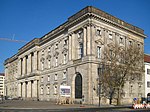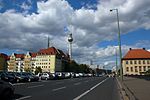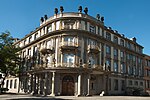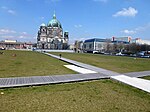Berlin Central and Regional Library
The Berlin Central and Regional Library (German: Zentral- und Landesbibliothek Berlin) or ZLB is the official library of the City and State of Berlin, Germany. It was established as a Foundation by two State laws, initially in 1995 and amended in 2005, combining the following institutions: America Memorial Library (German: Amerika-Gedenkbibliothek), one of the largest public libraries in Berlin opened in 1954 and initially co-funded with a grant from the United States Berlin City Library (German: Berliner Stadtbibliothek), the municipal library of the city founded in 1901 Berlin Senate Library (German: Senatsbibliothek Berlin), the official library of the Berlin Senate, founded on 22 December 1948. Berlin General Catalog (German: Berliner Gesamtkatalog or BGK)In 2011 the library system had more than 3.4 million electronic and printed media. The Foundation is a legal deposit library for all publications appearing in Berlin. The ZLB also has significant historical and estate collections, and operates the Center for Berlin Studies in Ribbeck-House. The ZLB is a member of the Public Libraries in Berlin (VÖBB) and the Cooperative Library Network of Berlin-Brandenburg (KOBV). Partner libraries are the Centre Georges Pompidou in Paris and the Rudomino All-Russian State Library for Foreign Literature in Moscow.
Excerpt from the Wikipedia article Berlin Central and Regional Library (License: CC BY-SA 3.0, Authors).Berlin Central and Regional Library
Breite Straße, Berlin Mitte
Geographical coordinates (GPS) Address Nearby Places Show on map
Geographical coordinates (GPS)
| Latitude | Longitude |
|---|---|
| N 52.5153 ° | E 13.4045 ° |
Address
Landesarchiv
Breite Straße
10178 Berlin, Mitte
Germany
Open on Google Maps









